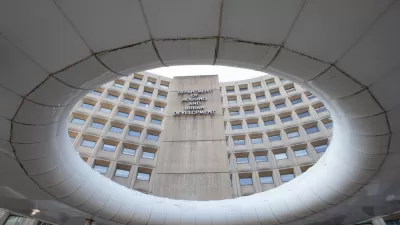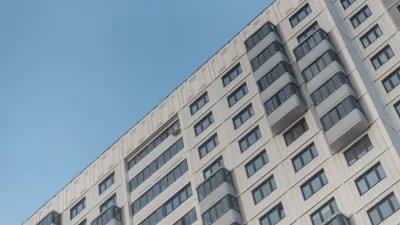A new rule proposed by the U.S. Department of Housing and Urban Development raises the burden of proof in cases of disparate impact, and provides additional defenses for defendants.

The U.S. Department of Housing and Urban Development published a new rule [pdf] regarding the disparate impact standards of the Fair Housing Act, following through on promises that date back to earlier times in the administration.
The news of the proposed rule, published on the Federal Register this Monday, was first reported by Katy O'Donnell for Politico at the end of July. Additional analysis by Lola Fadulu followed for the New York Times.
The day before the rule was published, Kriston Capps details the substance of the proposed rule for CityLab.
"The proposed regulation from the U.S. Department of Housing and Urban Development would replace an Obama-era rule on disparate impact, a legal theory that has guided fair housing law for more than 50 years," writes Capps.
The new rule "would substantially raise the burden of proof for parties claiming discrimination" and also "[carve] out an unprecedented guidance for the automated decision-making systems that power the housing market. "
The article by Capps includes more details on how the new rule would change the proceedings in disparate impact cases, both on the part of plaintiffs and defendants.
As noted by Capps, the new rule is the first federal regulation "to directly address algorithms and disparate impact." That component of the new rule is the subject of more analysis written this week by Emily Badger for the New York Times.
According to Badger's article, the disparate impact controversy applies to more examples than housing: "Industry groups and conservative legal advocates have long warned that any landlord, company or city official could be accused of discrimination simply if data shows racial patterns that exist for reasons beyond their control."
"If disparate impact becomes a less viable legal tool, civil rights groups counter that it will be almost impossible to curb policies and decisions that reinforce segregation and widen the racial wealth gap. If plaintiffs must prove that someone, somewhere, explicitly intended to discriminate, they’ll never be able to police city officials who keep that intent silent — or algorithms that have no 'intent' at all," adds Badger to present the reasons why fair housing advocates are concerned about the proposed rule.
The new rule entered a 60-day comment period when it was published on Monday.
FULL STORY: How HUD Could Dismantle a Pillar of Civil Rights Law

Planetizen Federal Action Tracker
A weekly monitor of how Trump’s orders and actions are impacting planners and planning in America.

Congressman Proposes Bill to Rename DC Metro “Trump Train”
The Make Autorail Great Again Act would withhold federal funding to the system until the Washington Metropolitan Area Transit Authority (WMATA), rebrands as the Washington Metropolitan Authority for Greater Access (WMAGA).

The Simple Legislative Tool Transforming Vacant Downtowns
In California, Michigan and Georgia, an easy win is bringing dollars — and delight — back to city centers.

The States Losing Rural Delivery Rooms at an Alarming Pace
In some states, as few as 9% of rural hospitals still deliver babies. As a result, rising pre-term births, no adequate pre-term care and "harrowing" close calls are a growing reality.

The Small South Asian Republic Going all in on EVs
Thanks to one simple policy change less than five years ago, 65% of new cars in this Himalayan country are now electric.

DC Backpedals on Bike Lane Protection, Swaps Barriers for Paint
Citing aesthetic concerns, the city is removing the concrete barriers and flexposts that once separated Arizona Avenue cyclists from motor vehicles.
Urban Design for Planners 1: Software Tools
This six-course series explores essential urban design concepts using open source software and equips planners with the tools they need to participate fully in the urban design process.
Planning for Universal Design
Learn the tools for implementing Universal Design in planning regulations.
Smith Gee Studio
City of Charlotte
City of Camden Redevelopment Agency
City of Astoria
Transportation Research & Education Center (TREC) at Portland State University
US High Speed Rail Association
City of Camden Redevelopment Agency
Municipality of Princeton (NJ)





























